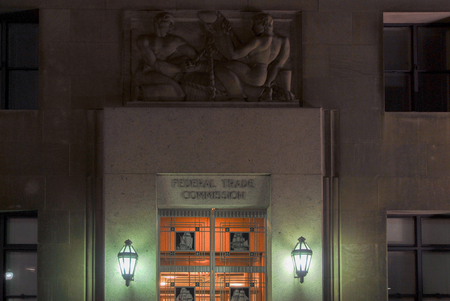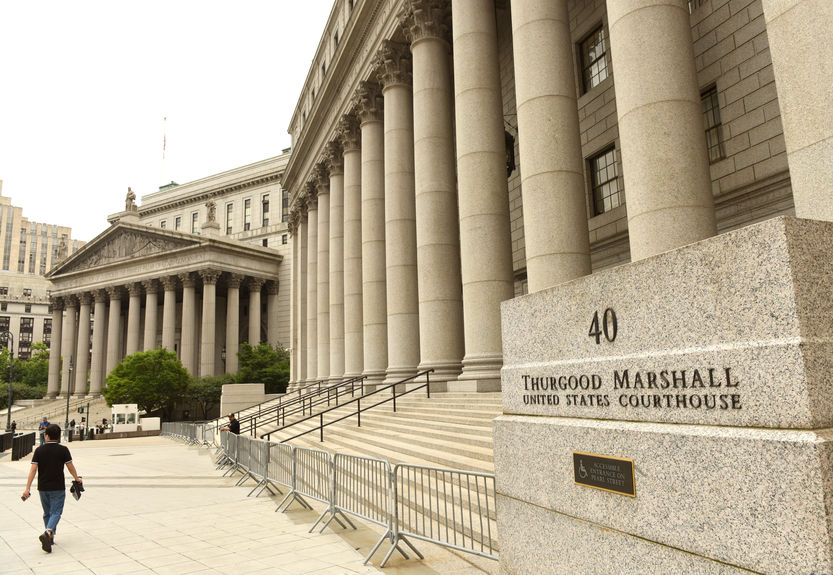Legal Briefs
Business Who Received Multiple MCAs is Charged by NJ AG
November 1, 2020New Jersey State Attorney General Gurbir S. Grewal and the New Jersey Bureau of Securities within the Division of Consumer Affairs is suing Owusu A. Kizito and his business Investigroup, LLC. Regulators allege that “he defrauded at least 57 investors out of nearly $2.2 million through the fraudulent sale of unregistered securities and then used much of the money for his own personal benefit, including payments for his Maserati.”
Among the allegations in the AG’s announcement is that the defendants used merchant cash advances which assigned away the company’s rights to its receivables and that it failed to disclose this material information to investors.
The FTC’s Power to “Wipe Out” is Under Siege
October 9, 2020 As the FTC contemplates how to “wipe out” entire industries, federal courts around the country have recently ruled that the regulator can’t accomplish such a goal under Section 13(b) of the FTC act. That’s the statute the FTC relied on to bring its most recent actions against merchant cash advance companies. It might not have bite.
As the FTC contemplates how to “wipe out” entire industries, federal courts around the country have recently ruled that the regulator can’t accomplish such a goal under Section 13(b) of the FTC act. That’s the statute the FTC relied on to bring its most recent actions against merchant cash advance companies. It might not have bite.
Under 13(b), the FTC is empowered to bring a lawsuit to obtain an injunction against unlawful activity that is currently occurring or is about to occur. It’s powerful, but very limited. However, for the last several decades, the FTC, with the help of federal courts, has interpreted the statute to mean that it can also force the defendants to “disgorge” with illegally obtained funds.
That’s how the FTC wiped out Scott Tucker and his payday lending empire. In a lawsuit the FTC brought against his companies under 13(b) in 2012, the Court entered a judgment of $1.3 billion against him.
Not so fast, modern legal analysis says. Tucker’s case is being brought before the Supreme Court of the United States to settle once and for all what 13(b) allows for and what it doesn’t.
The momentum does not weigh in the FTC’s favor.
On September 30, the Third Circuit ruled in FTC v AbbVie that the FTC is not entitled to seek disgorgement under 13(b). The Seventh Circuit arrived at a similar conclusion last year in FTC v Credit Bureau Center.
In an interview with NBC, FTC Commissioner Rohit Chopra said in August “We’ve started suing some [merchant cash advance companies] and I’m looking for a systemic solution that makes sure they can all be wiped out before they do more damage.”
As the FTC attempts to be more proactive in the area of small business finance, it will be important to monitor what the Supreme Court ultimately decides it can actually accomplish.
Important News for MCA Collection Actions in New York – Governor Cuomo Lifts New York Civil Litigation Tolling Deadlines After November 3, 2020
October 9, 2020 On March 7, 2020, Governor Andrew M. Cuomo issued Executive Order No. 202 Declaring a Disaster Emergency in the State of New York due to the COVID-19 pandemic. Executive Order 202 was followed by Executive Order No. 202.8 on March 20, 2020, which tolled (i.e., suspended) “any specific time limit for the commencement, filing, or service of any legal action, notice, motion, or other process or proceeding, as prescribed by the procedural laws of the state . . . until April 19, 2020.
On March 7, 2020, Governor Andrew M. Cuomo issued Executive Order No. 202 Declaring a Disaster Emergency in the State of New York due to the COVID-19 pandemic. Executive Order 202 was followed by Executive Order No. 202.8 on March 20, 2020, which tolled (i.e., suspended) “any specific time limit for the commencement, filing, or service of any legal action, notice, motion, or other process or proceeding, as prescribed by the procedural laws of the state . . . until April 19, 2020.
In lay terms, Governor Cuomo’s Order suspended any statute of limitations deadline for the filing of a lawsuit, and perhaps more important for debt collection activities in the Merchant Cash Advance industry, suspended the deadline for obtaining default judgments in the State of New York. In other words, even after New York State Courts reopened in May, New York Courts could not issue default judgments against defendants who failed to appear in response to a summons and complaint in any civil action, including collection actions, if the date of default for non-appearance occurred after March 20, 2020.
The Governor’s suspension of court deadlines continued well past the initial April 19, 2020 deadline, being extended by numerous executive orders throughout the summer and early fall. The most recent executive order, Executive Order No. 202.67 issued on October 5, 2020, extended the tolling deadline again until November 3, 2020.
But there is hope in sight. In addition to extending the suspension of court deadlines, Executive Order 202.67 states, “for any civil case, such suspension is only effective until November 3, 2020, and after such date any such time limit will no longer be tolled.”
The good news here for debt collection professionals is that deadlines in civil cases in New York State will begin to accrue again as of November 4, 2020. What this means is that any civil action properly served on a defendant that was suspended as of March 20, 2020, will begin to accrue again on November 4, 2020.
In summary, for the debt collection professionals in New York State, this means a return to business as usual on November 4, 2020.
Austin LLP is a law firm that supports the Merchant Cash Advance industry. As such this article is attorney advertisement. The opinions reflected in this article are those of the author and should not be construed as legal advice.
Yellowstone Capital Moves to Dismiss FTC Lawsuit
October 3, 2020 Newly revealed in court documents filed on Friday is that the recent FTC lawsuit against Yellowstone Capital culminated after a 2-year inquiry. What may have been a surprise to the Yellowstone defendants is how the FTC brought its case or that it ultimately even decided to bring one at all. A motion to dismiss has been filed.
Newly revealed in court documents filed on Friday is that the recent FTC lawsuit against Yellowstone Capital culminated after a 2-year inquiry. What may have been a surprise to the Yellowstone defendants is how the FTC brought its case or that it ultimately even decided to bring one at all. A motion to dismiss has been filed.
Specifically, counsel for Yellowstone references in its papers that in the preceding years, Yellowstone had already complied with FTC discovery requests that amounted to the production of “24,000 pages of documents, more than 1,400 audio recordings, and responses to numerous interrogatories and follow-up inquiries.”
Following that, the FTC filed suit on August 3, 2020, alleging Misrepresentations Regarding Collateral and Personal Guarantees, Misrepresentations Regarding Financing Amount, and Unfair Unauthorized Withdrawals. In it, it relies heavily on alleged materials dating as far back as five years ago to make its case.
This is fatal to the FTC’s suit, the defendants contend, because the FTC laid out its claims under a very specific statute of the FTC Act, Section 13(b), which can only be brought in federal court if they believe a defendant “is violating, or is about to violate” this area of the law. Past conduct, they say, even if it were true, is not applicable. No acts in 2020 or even from 2019 are alleged with any particularity, nor is it said that any might be happening or will happen.
 Some of the purported web pages, ads, or contracts that the FTC refers to no longer exist, have long since been replaced, were taken out of context, or could not even be identified as to where or whom they even originated from, defendants say.
Some of the purported web pages, ads, or contracts that the FTC refers to no longer exist, have long since been replaced, were taken out of context, or could not even be identified as to where or whom they even originated from, defendants say.
Defendants make further arguments for dismissal, one of which takes issue with alleged quotes or comments made by anonymous merchant customers. “The Complaint does not indicate, for instance, if these unidentified customers had breached their MCA agreements or otherwise incurred additional fees beyond the Purchased Amount that were due and owing to Yellowstone under their respective agreements.”
Deprived of all context and specifics, the complaint is loaded with elements that look bad but fall well short of the necessary legal burden, defendants essentially argue.
“The FTC has overextended itself in this litigation,” defendants say in their papers.
They further raise concern that it arises from a possible personal agenda rather than a legally-founded one. Reference is made to an NBC interview in which FTC Commissioner Rohit Chopra told the interviewer that “We’ve started suing some [merchant cash advance companies] and I’m looking for a systemic solution that makes sure they can all be wiped out before they do more damage.”
Chopra had also issued an official statement regarding Yellowstone in which he expounded almost entirely on legal questions that were not even raised in the lawsuit itself but create the impression that they are.
Yellowstone has asked for a stay of discovery pending the outcome of the motion to dismiss.
You can read Yellowstone’s full motion to dismiss here.
The FTC’s interest in this area of finance has been known for some time.
Another Attorney Charged Criminally in 1 Global Capital Saga
September 29, 2020 Andrew Dale Ledbetter, a veteran securities attorney who once co-authored a book called How Wall Street Rips You Off – and what you can do to defend yourself, now stands accused of ripping investors off.
Andrew Dale Ledbetter, a veteran securities attorney who once co-authored a book called How Wall Street Rips You Off – and what you can do to defend yourself, now stands accused of ripping investors off.
Ledbetter was criminally charged on Tuesday by the US Attorney’s office in South Florida for his alleged role in the 1 Global Capital Securities fraud case. Ledbetter was formally accused of Conspiracy to Commit Wire Fraud and Securities Fraud. He was simultaneously hit with civil charges by the Securities and Exchange Commission.
Both agencies say that Ledbetter reaped nearly $3 million in referral fees from 1 Global Capital in exchange for raising nearly $100 million from investors, mostly retirees, all while making knowingly false statements and misrepresentations about the investments. For instance, they say that he knew the investments were securities but claimed they weren’t anyway. Similar circumstances brought down Florida attorney Jan Douglas Atlas last year. Ledbetter had been compensating Atlas on the side as part of the alleged scheme.
Ledbetter is the 4th individual to be criminally charged in connection with the 1 Global Capital case. The other three: Atlas, Alan G. Heide, and Steven Schwartz, have all already pled guilty.
Business Loan Broker “The Tyrant” Sentenced to at Least Five Years in Prison
September 10, 2020The owner of a Long Island business loan brokerage convicted of orchestrating an advance fee loan scheme, was sentenced to prison this week. The judge handed Demetrios Boudourakis five to ten years and ordered him to pay a total of $880,000 in restitution to victims.
Boudourakis solicited business owners for a loan and then charged them an upfront fee when no loan was actually forthcoming. He pled guilty in June to the charge of grand larceny in the 2nd degree.
NYC Restaurants Have Had Enough, Two Lawsuits Filed to Reopen Indoor Dining
September 9, 2020 The five buroughs of New York City are still quiet. Restaurants remain closed to inside dining; gyms still await their regulars to return (beefcakes deflating with inactivity), and in-person schooling has been pushed back once again, while the districts take an extra week to prepare.
The five buroughs of New York City are still quiet. Restaurants remain closed to inside dining; gyms still await their regulars to return (beefcakes deflating with inactivity), and in-person schooling has been pushed back once again, while the districts take an extra week to prepare.
Through it all, business owners are losing money. Some have had enough.
Il Bacco, an Italian restaurant in Queens, is leading the charge. The restaurant recently filed a $3 billion class-action lawsuit against New York, signed by more than 300 restaurants. Il Bacco is a three-story eatery in Little Neck, 500 feet from the Nassau county border where restaurants can open to 50% capacity.
Another group of restaurants met separately at a rally in Staten Island to speak out against the inaction of lawmakers and to formally propose a separate lawsuit to force the reopening of restaurants.
On behalf of Bocelli, Joyce’s Tavern, and the Independent Restaurant Owners Association Rescue- (IROAR) papers were filed in Richmond County, calling for the emergency opening of restaurants throughout NYC at 50% capacity. IROAR was started last week as a confederation of 14 disgruntled restaurants. More recently the association has grown to 180 members.
Tina Maria, daughter of the owner at Il Bacco, also started an online petition with more than 5,000 signatures at writing.
On Sept 9th, shopping malls can open to 50% capacity and Casinos to 25% capacity, but restaurants like Il Bacco still struggle to make up for six months of decreased activity.
In speaking at the rally on Tuesday, Bob Deluca owner of Delucas Italian Restaurant said he and his workers have put in hundreds of hours of work a week just to see government officials keep his business from opening. Now he said, enough is enough.
“We’re being discriminated against, we’re being bullied,” Deluca said. “My mother told me to always stand up to bullies and stand up for people in need who are being bullied. Right here, this is our knockout punch.”
Deluca dropped the lawsuit on the podium, punctuating his frustration. He said he never wanted it to come to this, but it has come to it. Deluca reacted to Mayor Bill de Blasio’s comment from two weeks ago, stating restaurants were for the middle class and wealthy people.
“We are workers, it’s not a luxurious lifestyle, we are barely middle class,” Deluca said. “What about the waiters, the busboys, what about the dishwashers the bartenders, and the cooks. To say restaurants are for the middle class and wealthy is the most ignorant statement I’ve ever heard.”
OnDeck Directors Sued in Class Action For Allegedly Withholding “Material Information” From Shareholders To Make Enova Deal Happen
September 8, 2020 An OnDeck shareholder is asking the Delaware Court of Chancery to halt the sale of the company to Enova until OnDeck discloses allegedly material information that would appear to put the landmark deal in an entirely new light.
An OnDeck shareholder is asking the Delaware Court of Chancery to halt the sale of the company to Enova until OnDeck discloses allegedly material information that would appear to put the landmark deal in an entirely new light.
On September 4, Conrad Doaty filed a class action lawsuit against Noah Breslow, Daniel S. Henson, Chandra Dhandapani, Bruce P. Nolop, Manolo Sánchez, Jane J. Thompson, Ronald F. Verni, and Neil E. Wolfson for breaching their fiduciary duties owed to the public shareholders of OnDeck.
According to Doaty, the Enova offer of $90 million ($82 million stock, $8 million in cash) was not even the best bid that OnDeck received but he alleges that OnDeck’s directors and executives took it because they were individually offered “exorbitant personal compensation” including “millions of dollars in severance packages, accelerated stock options, performance awards, golden parachutes and other deal devices to sweeten the offer.”
Doaty makes reference to other bids for OnDeck with specifics including two all-cash offers, one that valued OnDeck at between $100 million and $125 million and one that valued it at between $80 million and $110 million. He says that no explanation for their rejection was disclosed.
Doaty also alleges that OnDeck relied on two sets of financial projections to evaluate a sale of the company, one for all prospective bidders (that projected a quick economic recovery) and another set that was used only for Enova (that projected a slow economic recovery). Doaty’s point is that Enova’s valuation was based on less optimistic data and that OnDeck did not publicly disclose to shareholders the more optimistic version that all the other prospective buyers of the company got to see.
“Most significantly, is that it is not pressing time to sell,” Doaty says. “The company was not facing imminent financial collapse or financial ruin.” He continues by pointing out that the company had $150 million of cash on hand and that it had successfully navigated workouts with its creditors over issues caused by the pandemic.
“Yet as a result of the frantic and unreasonable timing of the sale, the consideration offered for OnDeck is woefully inadequate.”
In addition to “exorbitant personal compensation” promised to the Board members, Doaty argues that a cheap price benefits parties who sat on both sides of the transaction, namely Dimensional Fund Advisors LP, BlackRock, Inc., and Renaissance Technologies, LLC, all of whom are said to hold greater than 5% beneficial ownership interest in both OnDeck and Enova. None of them are named as defendants.
“…even if the exchange ratio is unfair,” Doaty argues, “those institutional investors will still benefit from seeing their positions in Enova benefitted. Non-insider stockholders, on the other hand, will not be parties to the benefit.”
The law firm representing the plaintiff in Delaware is Cooch and Taylor, P.A.
Case ID #: 2020-0763 in the Delaware Court of Chancery.
You can download the full complaint here.
As an aside, deBanked mused two days prior to the filing of this lawsuit that the sales price of OnDeck was so low that early OnDeck shareholders stand to recover less of their investment as a result of this deal than investors in a rival company that was placed in a court-ordered receivership by the SEC.





























